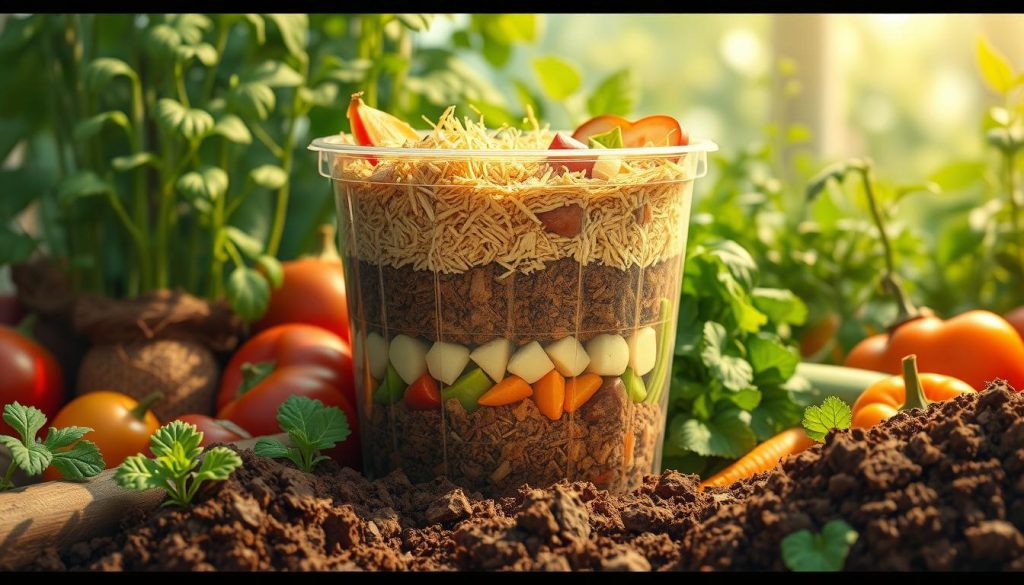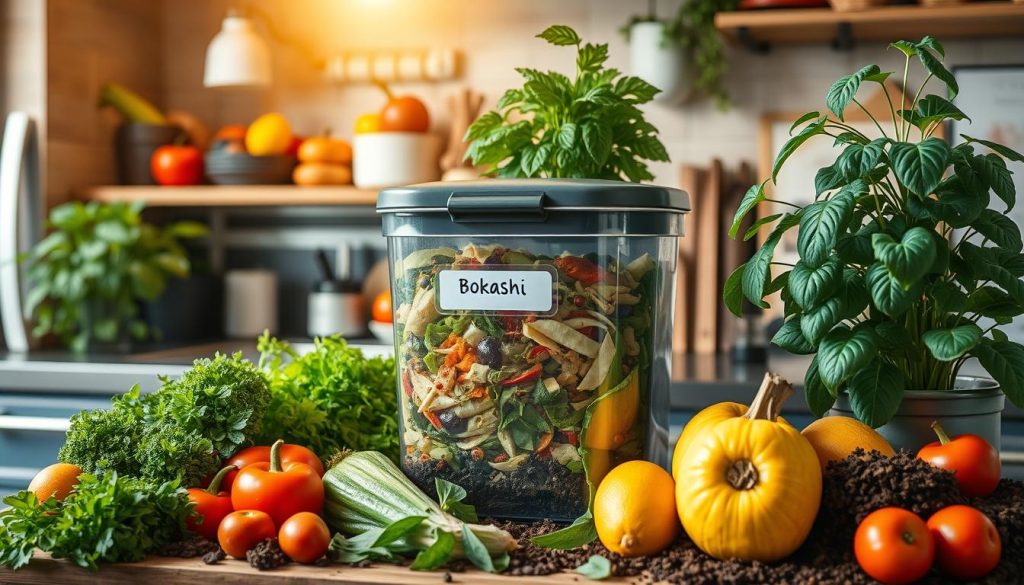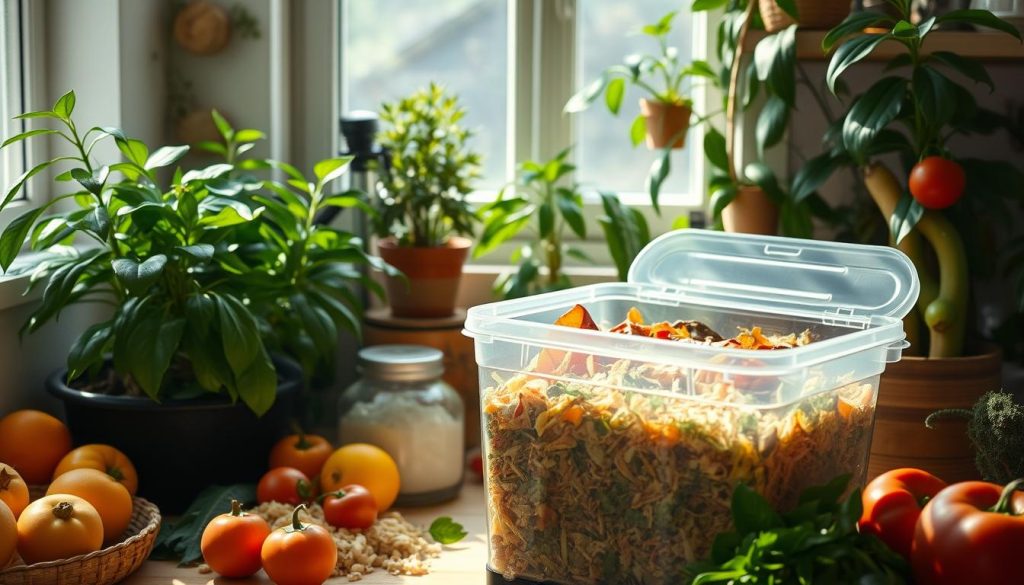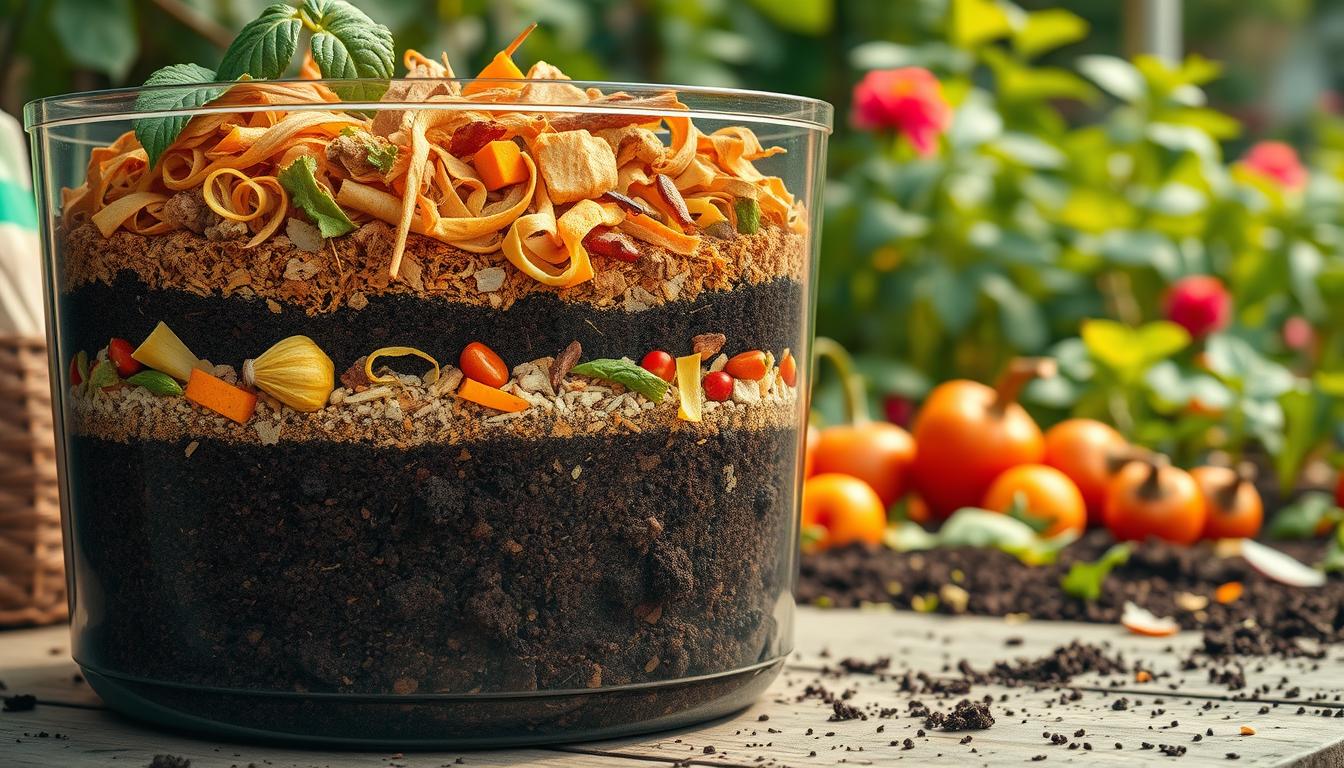I’m excited to share with you Bokashi composting, a unique way to turn organic waste into nutrient-rich soil. This method has many benefits, including reducing waste and promoting sustainable gardening. Let’s explore how it can help you.
Bokashi composting quickly breaks down organic matter, making it a great choice for eco-friendly gardening. You’ll learn how it works and its advantages. It’s a valuable tool for any gardener looking to improve their soil.
In this article, we’ll dive into Bokashi composting’s basics and benefits. I’ll give you a step-by-step guide to start using it. Whether you’re new to gardening or experienced, Bokashi composting can make your garden more sustainable and healthy.
What is Bokashi Composting?
To understand Bokashi composting, we need to know how it works. It’s different from traditional composting. Bokashi uses microorganisms in an airtight bin to break down organic matter. This creates a nutrient-rich compost.
Learning Bokashi composting means understanding microorganisms. These microbes, added with Bokashi bran, break down matter without oxygen. This process makes a liquid fertilizer and solid compost for soil.
The Basics of Bokashi
The Bokashi composting process is simple and can be done at home. You need a few key things:
- An airtight bin for the organic matter and microbes
- Bokashi bran to add microbes
- Organic matter like food scraps and yard waste
How It Differs from Traditional Composting
Bokashi composting uses microbes and an airtight bin. Traditional composting needs oxygen. Bokashi can handle more types of organic matter, like meat and dairy.

The Benefits of Bokashi Composting
Bokashi composting is great for gardeners and those who care about the environment. It quickly breaks down organic matter, cutting down on waste and the need for chemical fertilizers. This is thanks to special Bokashi materials that help with fermentation and decomposition.
Using Bokashi composting has many benefits. It makes a soil amendment that’s full of nutrients, improving soil health and fertility. This amendment is full of good microorganisms that help break down organic matter and make nutrients for plants. It helps gardeners reduce their environmental impact and grow a sustainable garden.
Quick Decomposition Process
The Bokashi composting process is fast, with most materials decomposing in a few weeks. This is because of the fermentation process, where microorganisms eat the organic matter. The compost that results is full of nutrients and helps improve soil structure and fertility.
Nutrient-Rich Soil Amendment
The nutrient-rich soil amendment from Bokashi composting is perfect for gardens, houseplants, and more. It’s full of beneficial microorganisms that support plant growth. By using Bokashi materials and following the right steps, you can create a sustainable garden that’s full of nutrients and microorganisms.

- Reduced waste and minimized need for synthetic fertilizers
- Creation of a nutrient-rich soil amendment
- Support for beneficial microorganisms and plant growth
- Improved soil health and fertility
How to Start Bokashi Composting at Home
To start Bokashi composting at home, you need the right stuff. You’ll need Bokashi composting bins and a starter kit. The starter kit has the microorganisms and instructions to begin.
Essential Materials Needed
Here’s what you need for Bokashi composting:
- Bokashi composting bins
- Bokashi composting starter kit
- Food waste, like fruit and veggie scraps, tea bags, and coffee grounds
Step-by-Step Bokashi Process
First, add food waste to the bin. Then, sprinkle it with the starter kit’s microorganisms. Finally, seal the bin. After a few weeks, bury the fermented mix in the soil. It will break down and feed your plants.
Troubleshooting Common Issues
Starting with Bokashi composting, I’ve hit some bumps. One big problem is bad smells. But, using Bokashi bran can fix this. It soaks up extra moisture and smells, making composting better.
Mold growth is another issue. It can be stopped by keeping the right mix of carbon and nitrogen. Keeping your Bokashi system in check is key. Here are some tips to avoid problems:
- Regularly drain excess liquid from the composting bin
- Maintain a balanced carbon-to-nitrogen ratio
- Use Bokashi bran to absorb odors and excess moisture
By following these tips and using Bokashi bran, you can avoid common problems. Stay alert and check your compost often for the best results.

Expanding Your Composting Skills
As you get better at Bokashi composting, it’s time to learn more. You can use Bokashi compost to make your garden better.
Using Bokashi for Garden Enhancement
Bokashi compost is full of nutrients that can help your garden. Adding it to your soil makes it more fertile and holds water better. It also brings beneficial microbes that create a healthy garden ecosystem.
Integrating with Other Composting Methods
Using Bokashi composting alone is great, but mixing it with other methods is even better. Try adding traditional composting or vermicomposting to your routine. This way, you can turn more waste into rich compost.
Keep learning and trying new things as you grow your composting skills. With Bokashi composting as your base, you can make your soil better and reduce waste endlessly.

